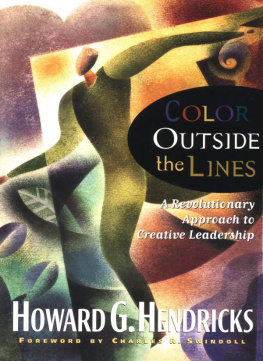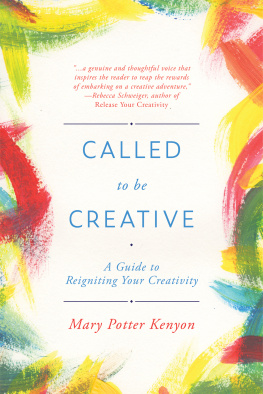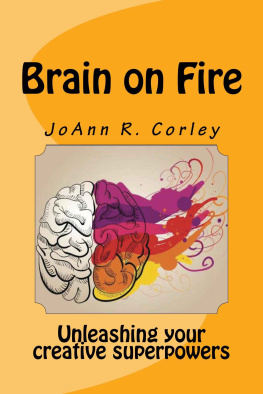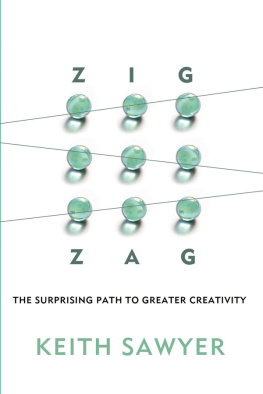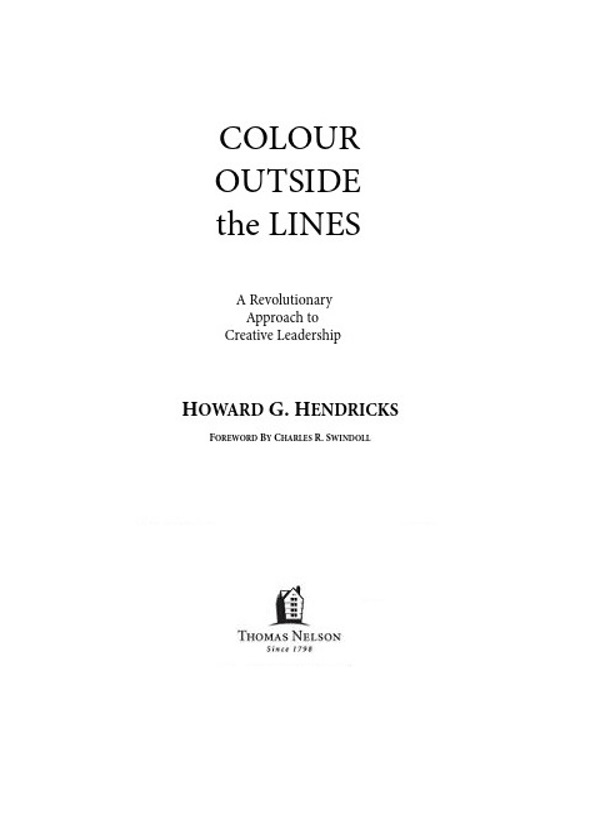1998 by W Publishing Group. All rights reserved.
Published in Nashville, TN, by Thomas Nelson. Thomas Nelson is a trademark of Thomas Nelson, Inc.
Thomas Nelson, Inc. titles may be purchased in bulk for educational, business, fund-raising, or sales promotional use. For information, please e-mail SpecialMarkets@ThomasNelson.com.
Unless otherwise indicated, Scripture quotations used in this book are from the Holy Bible, New International Version ( NIV ).
Copyright 1973, 1978, 1984 International Bible Society.
Used by permission of Zondervan Bible Publishers.
The theological opinions expressed by the author are not necessarily the official position of Dallas Theological Seminary.
Hendricks, Howard G.
Color outside the lines : learning the art of creativity / by Howard Hendricks.
p. cm.
Includes bibliographical references.
1. Creative abilityReligious aspectsChristianity. I. Title. II. Series.
Please note that footnotes in this ebook may contain hyperlinks to external websites as part of bibliographic citations. These hyperlinks have not been activated by the publisher, who cannot verify the accuracy of these links beyond the date of publication.
You want creativity? Ill give you creativity in two words: Howard Hendricks!
In a day when Christians tragically mistrust artists and minimize esthetic value, I find it refreshing that a seasoned scholar, teacher, and Bible expositor has written a volume linking effective biblical ministry with creativity. Talk about a book thats overdue!
In vintage Hendricks style, my esteemed mentor and longtime friend, with lighthearted ease, helps us bulldoze away the crusted layers of dull thinking that have settled in our minds like green-brown slime at the bottom of a country pond. He refuses to let all that stuff sit, soak, and sour.
He challenges us to see life and ministry through a different perspective. To go beyond what is comfortable and predictable and reach for a level of imagination that compels and inspires people to respond. And since we are talking about communicating the glorious life-changing message of Christ, his mandate for fresh, creative approaches to proclaiming the Good News rings loud and clear.
As always, Dr. Hendricks has done his homework. This volume is not the result of a frustrated, preoccupied theologian trying hard to connect. He is grounded in the Scriptures and brings to this subject years of not only teaching creativity, but also doing creative teaching. This is one man who truly practices what he preachesevery time!
I commend this book to pastors, teachers, evangelists, missionaries, public speakers, small-group leaders, Sunday-school teachers, and anyone else wishing to impact the lives of people whom the Lord has called you to serve. In my opinion, the number-one tragedy in Christian education todaydespite all the advances in technology and creative artsis a teacher who is boring! This volume is a sure cure for that common pedagogical disease.
Here is your opportunity to be schooled by the master communicator on how to think creatively as well as how to be creative. You may be surprised just how wonderful a picture God creates in your life and ministry when you allow yourself the freedom to color outside the lines.
Happy coloring!
C HARLES R. S WINDOLL
General Editor
Everyone is born a genius, but the
process of living de-geniuses them.
R. B UCKMINSTER F ULLER
Like a verbal bombshell, the word creativity explodes shrapnel into the private wish list of most people. This is because we have stuck the label on a few artistic super-achievers and envy it as a touch of genius out of reach for most of us mortals.
Today the new and different has achieved a dizzying popularity. Creativity has dilated into more than a word today; it is an incantation... a kind of psychic wonder drug, powerful and presumably painless. Everyone wants a prescription, says John Gardner, with his uncommon perception of our human quest for elixirs.
As Christians, of course, we want to be inventive and original. But our efforts often send eyeballs rolling and bosses shaking their heads benignly as if we were village idiots. We privately agree with the kids that the worship service, the Sunday-school class, or the youth group is pretty boring. And we long to present the gospel message more attractively. But how?
Like icons on a computer screen, creativity evokes pictures in our heads: Disneyland, cartoons, or some famous performer. Perhaps Alice in Wonderland, the Iliad, a symphony, or a famous painting illustrates for us invention and new expression.
We all recognize that artists, actors, and inventors are creative. Perhaps we think of an eccentric uncle who writes weird poetry, a cousin who concocts unheard-of games, or a next-door neighbor whose home is unusually unique. Yet few of us feel that creativity defines our own efforts. We strive to be individualists but often find ourselves merely imitating others. How, then, can we become creative?
Beautiful blooms always grow out of fertile soil. Ink on paper can never give birth to your own vision and inspiration, but it can jump-start your thinking and fuel your possibilities. Eric Hoffer, the famous blue-collar union worker who became a writer/motivator, has defined creativity as discontent translated into art. Thats my hope for youthat this book will inspire a holy discontent that propels you to get up and go! I yearn for every reader to find here a resourceful environment from which he can develop a can-do lifestyle.
Young people often ask me, Should I go to seminary? I respond to their question with a question of my own: What do you want seminary to do for you?
Oh, an eager prospect replies, I want to be a man (or woman) of God! Fantastic! But the brutal fact is, no seminary or any other institution can make you a man or woman of God. Hopefully it can motivate and equip you, but only God can make you to be like Himself. You will be as spiritual as you are willing to trust Him to make you.
So it is with creativity.
When man in Eden first turned away from the One who created him, he began a journey that would take him steadily away from his divine Designer. Drudgery sank into boredom and sagged into rebellion and violence. Had not the loving Father intervened with His most creative solutionJesus Christ, God in the fleshmankind would have destroyed itself.
Imitating our God and Savior allows us to reverse the downward trend, to conceive new ideas and formulate fresh approaches to life and ministry. I invite you to join me in a page-turning seminar that could overthrow the stale and sterile government of your thinking.
What is it, this something that exists in select people to make them clearly originals? Is it a genetic spin that God drops into families? A state of mind that happens in certain rare environments? Why does creative thinking seem so easy for some but totally elusive for others? How can many people be so boringly predictable, while others always seem to be ambushing from an exciting and unexpected direction?

